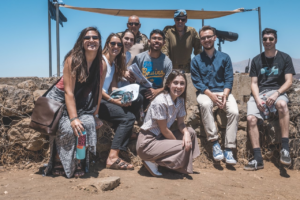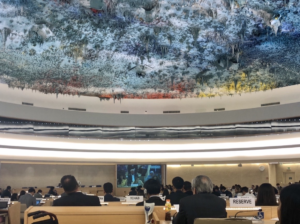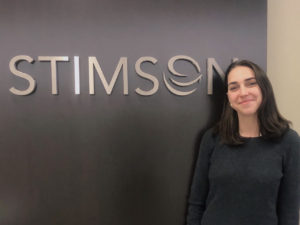Research for Action
I first read the Iliad when I was 17, and I was completely enthralled by the riveting narrative and winding similes. For the following few months, I was convinced that I would go to school to study Greek classics, maybe learn ancient Greek, and spend the rest of my days happily buried in epics and tragedies. Evidently, that did not happen. But many of the themes that drew me into these stories—understanding the consequences and complexities of individual decision-making, the unyielding passion to defend one’s beliefs, and the painful human cost of conflict—are the same that drive my desire to pursue a career in international peace and security.
In some ways, this path has been a natural one for me. Both of my parents worked overseas, and I used to joke that my brother and I were raised in airports. My parents often took us with them on their travels, and moves to Chad and Cameroon interrupted our D.C. childhood. When we were in one place, I attended a Quaker school, and though not Quaker myself, I deeply value the principles that this education imparted upon me. Reflecting on tenets of peace, non-violence, and consensus building deeply shaped my interest in conflict resolution from an early age.

Katie and fellow participants of the Olive Tree Initiative with UN Peacekeepers in the Golan Heights in 2017.
However, it was not until I got to college that this field really opened up to me. I had never even heard of Peace and Conflict Studies before attending UC Berkeley. Yet after just one introductory semester, I had declared it my major. Berkeley gave me the opportunity to take my vague interest in international affairs and run with it. I had the opportunity to travel to Jordan, Israel, and the West Bank through the Olive Tree Initiative to study the intersections of conflict with topics such as gender, technology, sustainability, public health, and law. I also studied abroad at the University of Geneva and interned at the Centre for Humanitarian Dialogue, an organization I had long admired for its dedication to mitigating armed conflicts through mediation.

The UN Human Rights Council in Geneva, where Katie attended several meetings while working for the Centre for Humanitarian Dialogue in 2018.
These brief tastes of “real world action” made the transition back to academia my senior year frustrating. The research I had begun in Geneva eventually turned into my senior thesis, and though I was proud of the product, I was always unfulfilled when I remembered that only one or two professors would ever read it, and ultimately, it was just for a grade. Working as a Scoville Fellow at the Stimson Center has allowed me to remedy that feeling, further closing the gap between the academic research I love and my desire to see it applied.
I have had the chance to participate in meetings where decisions are made, meet some truly inspiring and dedicated individuals, and I am even writing a report based on my senior thesis research—but (hopefully) this time, more than two people will read it. This report, which analyzes the UN Refugee Agency’s management of past Rohingya refugee movements, has pushed me to go beyond an academic understanding of the issue and create concrete policy recommendations. This unfamiliar process has proven difficult but incredibly valuable.
In addition to my independent work, I contribute research to several other projects for Stimson’s Transforming Conflict & Governance team, such as a project on strengthening NATO’s capacity to protect civilians. I also help organize a monthly roundtable at Stimson called the Atrocity Prevention Study Group, which brings together government officials, NGOs, and scholars. These experts exchange research and knowledge, provide updates on current developments in the field, and discuss policy options. This experience has allowed me to better understand the crucial interdependence of key players working on peace and security. In other words, good policy needs good research, and good research should be about guiding good policy.
A few weeks ago, someone described the work we do at Stimson as “research for action,” and I have since clung on to that phrase. Research is not just about describing or analyzing problems—it is about solving them. The field of international peace and security, while perhaps it has never been more challenged, has also never been more relevant. As such, it is inspiring to be surrounded by colleagues who vehemently believe in the importance of turning in depth analysis and knowledge into tangible solutions and change. I could not be more excited to contribute to that process.
Though ultimately I did not pursue Greek classics, I still often find myself flipping through my well-worn copy of the Iliad. Recently, one quote in particular has stood out: “Be both a speaker of words and a doer of deeds.” To me, this quote perfectly encapsulates this idea of research for action that has underscored my fellowship. In college, I learned how to be a speaker—or perhaps more accurately, a writer—of words. In just my first few months as a Scoville Fellow, I feel like I am learning to become a doer of deeds.
Katie Dock is a is a Fall 2019 Scoville Fellow at the Stimson Center.

